Best NFT Tax Software: Buying Guide [2024]
We've picked the best NFT tax calculators so you don't have to.
Blockpit employs strict editorial principles to provide accurate, clear and actionable information. Learn more about how we create and review content.
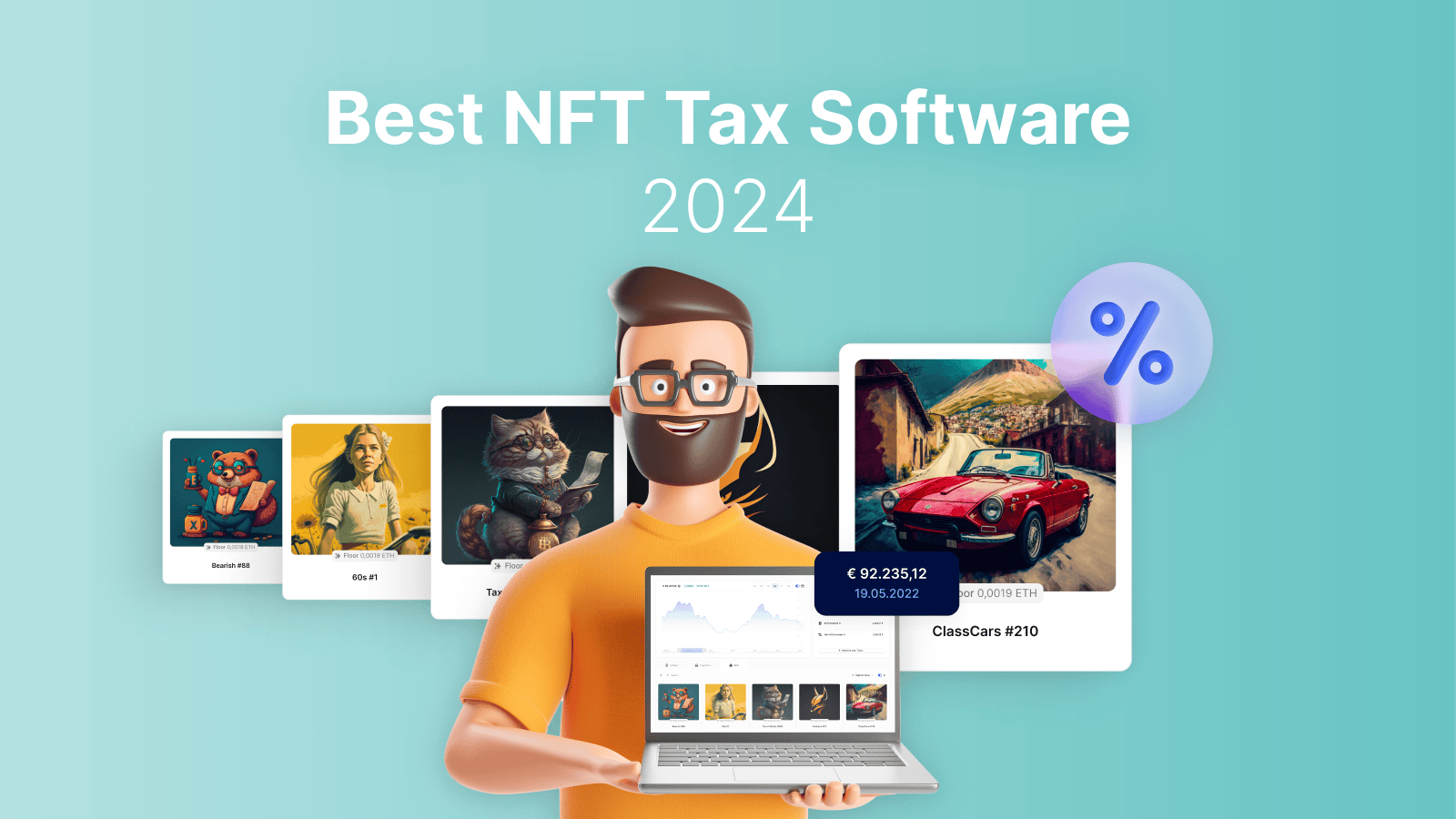
tl;dr
- NFT tax software helps users calculate capital gains taxes on their digital asset transactions.
- It can automatically track the cost basis and fair market value of NFTs at the time of purchase and sale.
- The software often integrates with popular wallets and exchanges to simplify transaction history import.
- Some platforms offer features like tax-loss harvesting to optimize NFT investment strategies for tax purposes.
- Regulatory compliance is key; ensure the software is updated with the latest tax laws and guidelines related to NFTs.
NFTs, or non-fungible tokens, are a revolutionary application of blockchains that quickly turned into the biggest crypto trend of the past years.
NFTs allow for the creation of unique digital assets that can be owned, traded, and verified as one-of-a-kind. This has huge implications for the world of digital art, music, and other forms of creative expression, as it allows creators to sell their work as authentic, unique pieces with verifiable ownership.
That being said, NFTs lead to lots of opportunities to buy, trade and sell – and to realize massive gains and losses. And where there are gains and losses, there are taxes. In this guide, we will be taking a close look at some of the leading NFT tax software on the market, so you can keep track of your NFT transactions and optimize your tax obligations with ease.
We will also be providing you with useful tips and information on how to choose the right NFT tax software for your needs, comparing their use cases, features, pricing, and user reviews.
{{cta-banner-tax-generic="/elements/reusable-components"}}
Best NFT Tax Calculators 2024
<figure class="block-table">
<table>
<thead>
<tr>
<th>Name</th>
<th>NFT Support</th>
<th>DeFI Support</th>
<th>Portfolio Tracking</th>
<th>Pricing</th>
</tr>
</thead>
<tbody>
<tr>
<td>Blockpit 🥇</td>
<td>Full Support</td>
<td>Full Support</td>
<td>Yes, Free</td>
<td>from 49€</td>
</tr>
<tr>
<td>CoinTracker</td>
<td>Limited</td>
<td>Limited</td>
<td>Yes, 14€/mo.</td>
<td>from 59€</td>
</tr>
<tr>
<td>TaxBit</td>
<td>Very Limited</td>
<td>Very Limited</td>
<td>–</td>
<td>free</td>
</tr>
<tr>
<td>TokenTax</td>
<td>Yes</td>
<td>Yes</td>
<td>No</td>
<td>from 65$</td>
</tr>
<tr>
<td>Koinly</td>
<td>Yes</td>
<td>Limited</td>
<td>Yes, Free</td>
<td>from 49€</td>
</tr>
<tr>
<td>ZenLedger</td>
<td>Limited</td>
<td>Yes</td>
<td>No</td>
<td>from 49$</td>
</tr>
<tr>
<td>CryptoTaxCalculator</td>
<td>Full Support</td>
<td>Full Support</td>
<td>Yes, Free</td>
<td>from 49$</td>
</tr>
<tr>
<td>Coinpanda</td>
<td>Yes</td>
<td>Yes</td>
<td>Yes, Free</td>
<td>from 49$</td>
</tr>
</tbody>
</table>
</figure>
Understanding NFT Taxation
Tax implications have to be understood for various transactions, like minting, trading, selling and gifting NFTs. This is a complex topic, specifically because tax laws can differ from country to country. Click on the links to get directed to the country specific tax guide with more in depth information.
Crypto taxation in Germany sees NFT purchases or sales as an exchange of a token and therefore levies the personal income tax rate. However, if the holding period of the NFT exceeds one year, the NFT can be sold tax-free.
Crypto taxation in Austria has changed significantly with the new crypto tax regulation that came into force on 01.03.2022. NFTs, however, are not considered a crypto asset and still fall under the old regulation. Therefore, the personal income tax rate is applied on gains made from selling NFTs. However, NFTs can be sold tax-free in Austria after a holding period of one year.
Crypto taxation in France takes a different approach: Buying, minting, swapping and farming of NFTs are not taxable. However, if you make a capital gain from the use cases of NFTs and realize this gain in fiat currency, it will result in a taxable event.
Crypto taxes in the Netherlands are handled a little differently, by declaring the value of your assets (not just crypto) on January 1st of the tax year. In general, NFTs are assets that have to be declared under Box 3. However, there is an exemption for works of art. If, the underlying asset of the NFT is considered to be a work of art, should be reviewed by the taxpayer or a tax advisor.
Crypto taxation in the United States treats NFTs as property, subject to capital gains and income tax, like other cryptocurrencies.
Crypto taxation in the UK is equally straightforward when it comes to selling NFTs: you'll likely have to pay capital gains tax on any NFT profits you realise.
Features to Consider in NFT Tax Software
A good NFT tax solution needs to offer various different functionalities to generate accurate tax reports.
Automatic tracking of your transactions via integrations with popular marketplaces and the best crypto wallets is a key feature. It not only saves you a lot of time, but guarantees that the crucial information associated with your NFT transactions is correct. Proper cost basis tracking is essential to ensure accurate reporting.
Additionally, support for country-specific tax frameworks should be high up on your list of features to look for. The automatic calculation of your gains and losses and presentation in a country-specific tax report makes tax reporting easy and eliminates the need for a tax advisor.
Check out this list for the most important features:
- Support for NFTs and DeFi
- Automatic import of transaction data from exchanges, marketplaces and wallets via API connection or public key import
- Manual import of transaction data via CSV upload
- Identification and tracking of cost basis and capital gains/losses
- Ability to handle tax loss harvesting
- Support for inventory methods like FiFo
- Accurate calculation of taxes owed based on country and jurisdiction-specific tax laws
- Individual tax form generation
- Secure storage of user data and encryption of sensitive information
- Data visualization and reporting tools
You should also look for these features if you also traded other crypto:
- Support for all major cryptocurrencies and blockchains
- Ability to handle forks, airdrops, and other complex transactions
- Ability to handle margin trading, futures, and derivatives trading
Check out our software comparison for the best crypto tax tools for more details!
{{cta-banner-generic-en="/elements/reusable-components"}}
Best NFT Tax Software Options
Blockpit
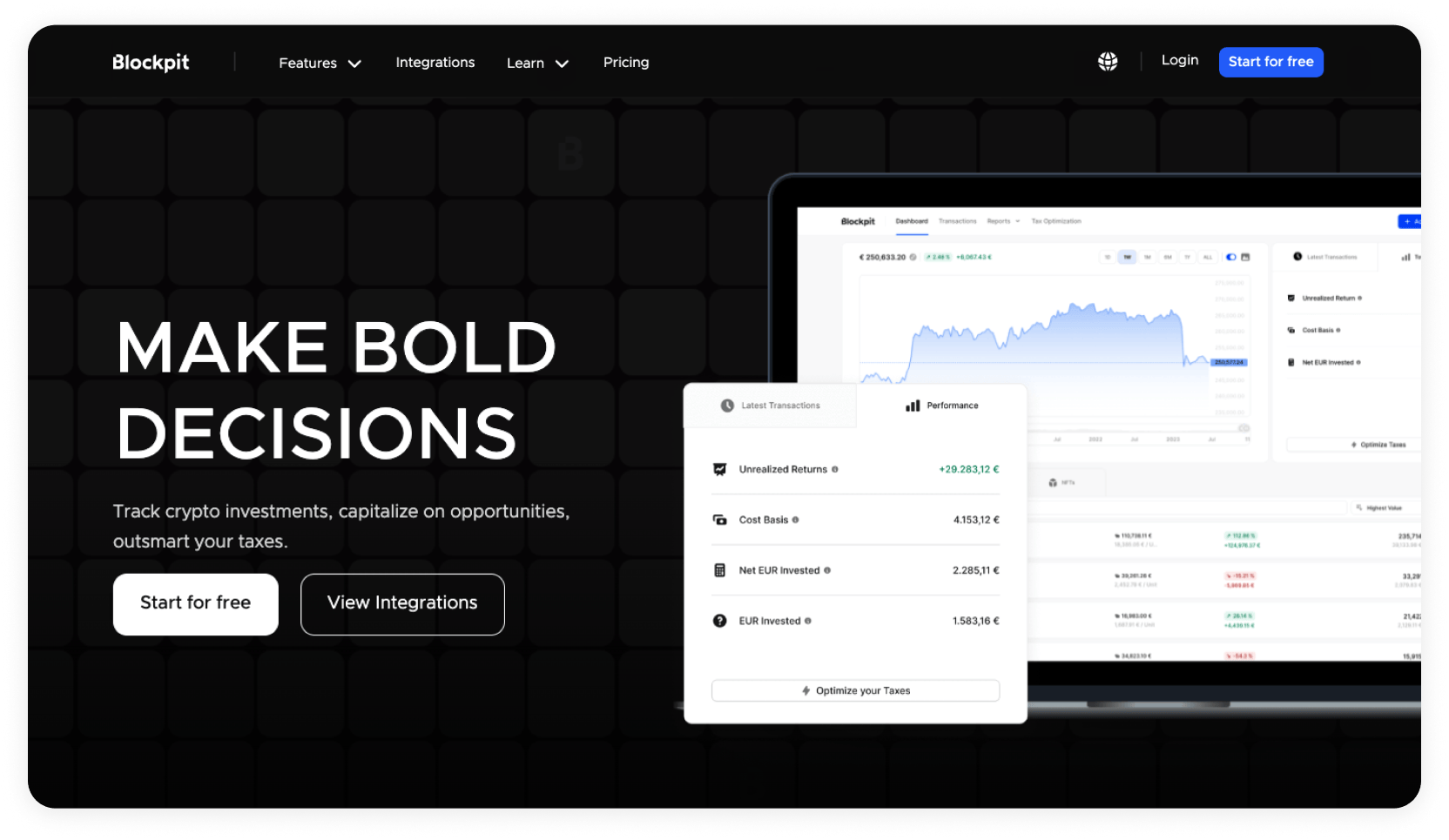
Founded in 2017, Blockpit was one of the first companies in Europe to take on the taxation of crypto assets and provide a leading crypto tax solution for individual investors.
The company is also actively involved in shaping and enforcing crypto regulation within European policies.
Blockpit’s NFT tax calculator stands out with a sophisticated approach to NFT taxation. It supports NFTs on multiple blockchains and displays NFT images directly in the portfolio overview.
It offers direct integrations for a variety of exchanges, marketplaces and wallets and offers a tax-optimization feature by identifying current gains and losses.
Blockpit offers country specific tax reports, pre-filled tax forms and additional explanations for tax authorities. Blockpit’s tax reports have been created in cooperation KPMG.
Importing and tracking your NFTs and other crypto transactions in Blockpit is free.
In addition, Blockpit shines with highly dedicated customer support.
Features
- See your NFT images directly in the transaction overview
- NFT support on multiple blockchains
- Individual tax treatment per asset type (crypto, NFTs, derivatives, commodities, fiat)
- Country specific tax reports with pre-filled tax forms
- Explanations for tax authorities
- Tax optimization and portfolio tracking included
- No individual tax settings available
Pricing
Per Tax year:
- Free – Portfolio tracking without tax reports
- Lite – 49€ – Portfolio tracking, tax reports for up to 50 transactions
- Basic – 99€ – Portfolio tracking, tax reports for up to 1k transactions, tax optimization feature
- Pro – 249€ – Portfolio tracking, tax reports for up to 25k transactions, tax optimization feature
- Unlimited – 599€ – Portfolio tracking, tax reports for unlimited transactions, tax optimization feature
Trial
Free trial with unlimited import of transactions and portfolio tracking. No tax report.
NFT & DeFi
NFT support on Ethereum, Polygon, Solana, Terra, Crypto.org, Avalanche, Klaytn, Fantom, Tron, BNB Smart Chain, Harmony, Velas, XRP / (including images)
Support of major DeFi protocols on Ethereum, Polygon, Solana, Terra, Crypto.org, Avalanche, Klaytn, Fantom, Tron, BNB Smart Chain, Harmony, Velas, XRP, Osmosis, Moonbeam, Kujira
Country Support
Austria, Germany, Netherlands, US, Spain, France, Switzerland, Belgium
{{cta-banner-tax-generic="/elements/reusable-components"}}
CoinTracker
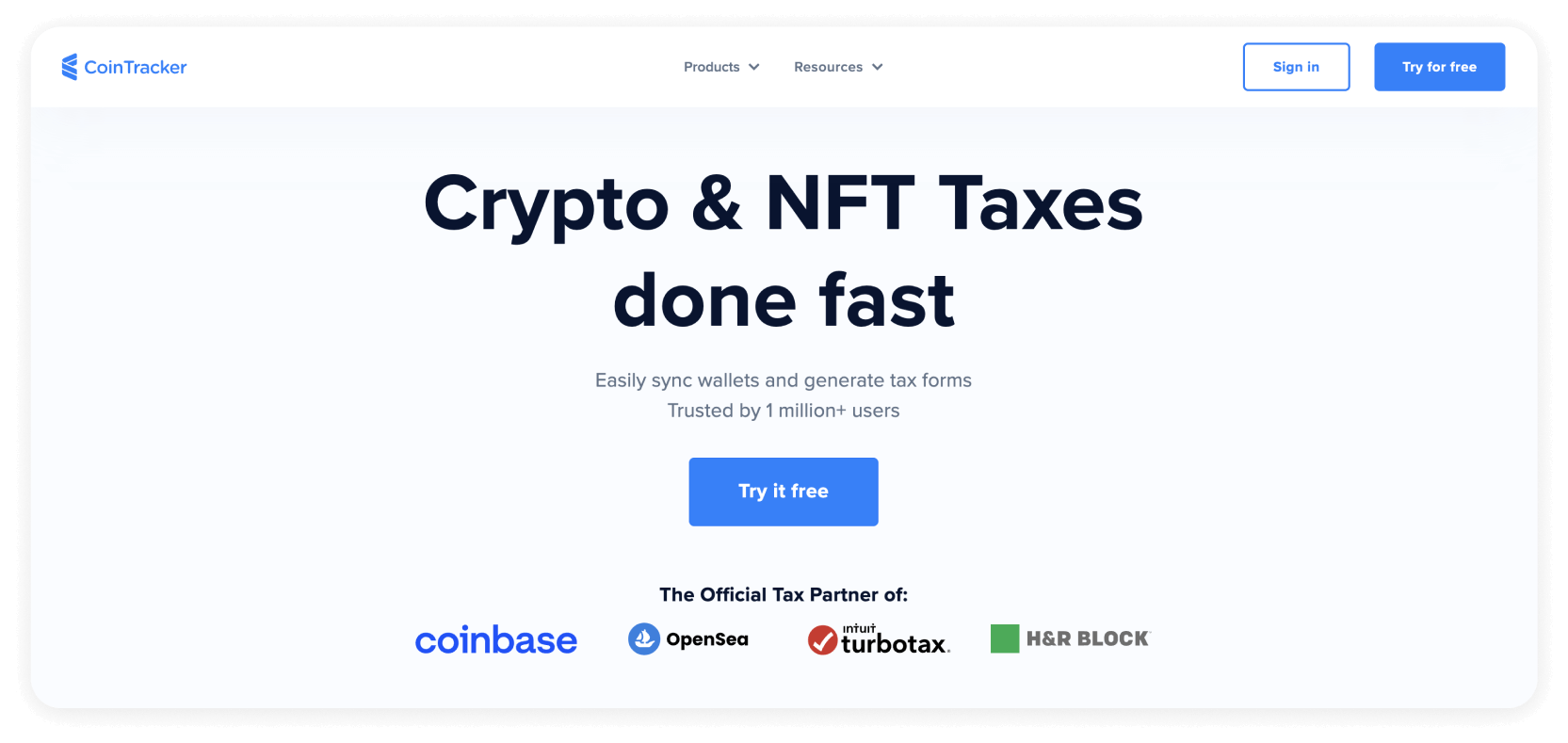
CoinTracker offers NFT support on Ethereum and Solana and displays Ethereum NFT images in the transaction overview.
It stands out by offering a free tier including tax report, auto sync with unlimited exchanges and wallets and basic portfolio tracking for users with up to 25 transactions.
It supports more than 300 exchanges and 8000 cryptocurrencies and is able to connect to platforms like TurboTax or TaxAct for e-filing of your tax report.
Country specific support is available for US, India, UK, Canada, and Australia and partial support for several other countries.
You have the option to share your tax report with tax professionals for further guidance. The pricing is based on your number of transactions.
Features
- NFT Gallery for Ethereum addresses
- automatically connect to TurboTax, H&R Block Online, TaxAct, or Wolters Kluwer CCH for e-filing of tax report
- Limited options for manual editing of transactions
- Only shows NFT images on Ethereum
- Lack of DeFi support on other chains
- Tax loss harvesting feature only integrated in portfolio management plan (Pro)
Pricing
Portfolio management:
- Enthusiast - $14 per month
- Pro - $99 per month (includes tax loss harvesting feature)
Per tax year:
- Hobbyist – 59€ – up to 100 transactions
- Premium – 179€ – up to 1k transactions
- Unlimited – priced individually
Trial
Free tier with 25 transactions including tax report, unlimited import of transactions, basic portfolio tracking
NFT & DeFi Support
Support for NFTs on Ethereum and Solana
Support for DeFi on Ethereum
Country Support
Full support for US, India, UK, Canada, and Australia and partial support for several other countries.
Koinly
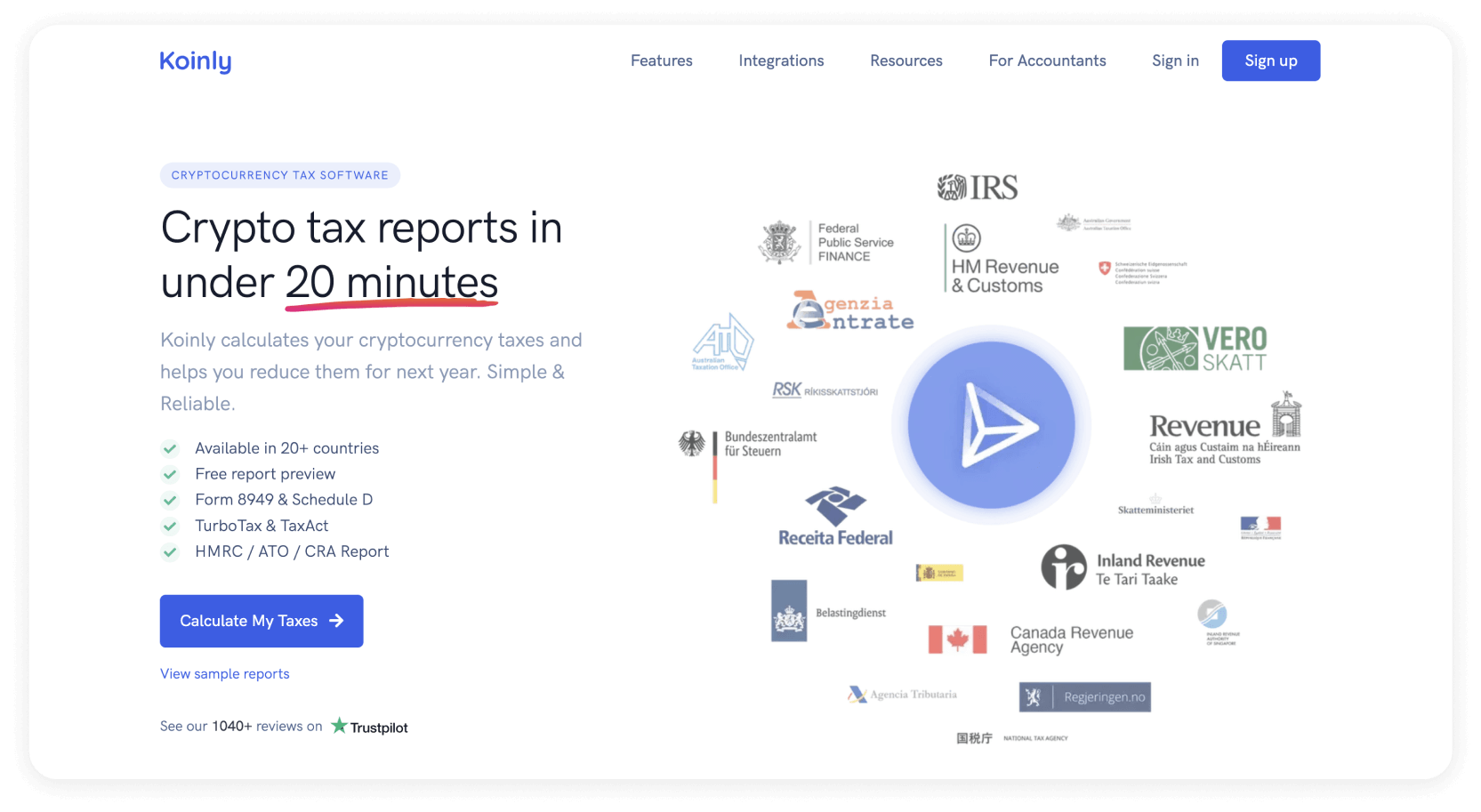
Koinly one of the most popular crypto tax tools, provides basic NFT support for most EVM-based blockchains and Solana.
It stands out with a very beginner-friendly and intuitive interface.
The extensive free version offers, apart from the tax reports, almost all features for up to 10.000 transactions.
Generic tax reports for 34 countries are available, supporting multiple cost-basis methods.
US customers can export a file that can be uploaded directly into a tax filing software like TurboTax or TaxACT.
Koinly supports more than 20.000 cryptocurrencies, numerous exchanges, wallets and blockchains and is compatible with DeFi, Margin and Futures trading.
Features
- TurboTax Online (and CD/DVD), TaxACT
- Multiple cost-basis methods
- Smart transfer matching between your own wallets
- Good user experience, easy to reconcile transactions manually
- Basic NFT support (not showing the pictures in the transaction overview) for most EVM-based blockchains such as Ethereum, BNB Smart Chain, Fantom, Avalanche, Polygon, Cronos as well as Solana.
- No tax-loss harvesting feature
- No prefilled country specific tax reports outside the USA
Pricing
- Newbie – 39€ – up to 100 transactions
- Hodler – 89€ – up to 1.000 transactions
- Trader – 169€ – up to 3.000 transactions
Trial
Free trial with up to 10.000 import transactions. No tax report.
NFT & DeFi Support
NFT support for EVM-chains and Solana
DeFi support for basic 1:1 transactions
Country Support
Generic tax reports for 34 countries (support of multiple cost-basis methods depending on country: FIFO, LIFO, HIFO, Average Cost, Share Pooling & Spec ID)
Pre-filled tax form for USA
Coinpanda

Coinpanda supports NFT & DeFi transactions and displays your NFT images directly in the transaction overview.
If you don’t exceed 25 transactions, Coinpanda is the way to go.
The free license includes unlimited imports, DeFi, NFTs, Margin trading and of course, tax reports.
Country specific reports are available for countries like the US, Canada, Germany and Norway.
Capital gains can be calculated for all countries that use FiFO or LiFO as cost basis methods.
Reports are available for TurboTax, TaxAct and Wolters Kluwer.
Coinpanda supports more than 7000 cryptocurrencies and a vast number of exchanges via API import.
Features
- TurboTax, TaxAct, Wolters Kluwer
- shows NFT pictures directly in the transaction overview
- very hard to reconcile transactions manually
- very basic tax loss harvesting feature
Pricing
Per tax year
- Free – 25 transactions
- Hodler – $49 – up to 100 transactions
- Trader – $99 – up to 1.000 transactions
- Pro – $189 – up to 3.000 transactions
Trial
Free plan with up to 25 transactions and tax report.
NFT & DeFi Support
Yes
Country Support
Coinpanda supports all countries that use FIFO or LIFO cost basis methods for calculating capital gains. Custom tax reports & forms for certain countries like the US, Canada, Germany & Norway.
CryptoTaxCalculator

CryptoTaxCalculator is a company from Australia founded in 2018.
It comes with NFT and DeFi support and a generous free version including three crypto exchange or wallet integrations and a basic tax report for up to 100 transactions.
Access to the various features, like advanced reports, tax loss harvesting or priority support, depend on the subscription model. Multiple exchanges can be integrated via API keys, CSV uploads are supported as well.
CryptoTaxCalculator provides generic reports with predefined country-specific tax settings for 22 countries.
Features
- Generous free version
- Hard to manually edit transactions (especially converting deposits/withdrawals to trades or transfers)
- Weak token database, i.e. tokens listed under the top 200 on Coinmarketcap are not recognized by the software
- Overwhelming UI with a lot of information
Pricing
Subscription, billed yearly
- Hobbyist – 99€ – up to 1.000 transactions
- Investor – 249€ – up to 10.000 transactions, tax loss harvesting
- Trader – 499€ – up to 100.000 transactions, tax loss harvesting
Trial
Free trial with up to 100 transactions, 3 integrations, and basic tax report.
NFT & DeFi Support
Yes
Country Support
Generic reports with predefined country-specific tax settings for each of the supported countries: Canada, US, Australia, Japan, New Zealand, Singapore, Austria, Belgium, Germany, Finland, France, Greece, Ireland, Italy, Netherlands, Norway, Portugal, Spain, Sweden, Switzerland, United Kingdom, South Africa
ZenLedger

ZenLedger was founded in 2017 and has full NFT and DeFi support.
The subscription plans differ between the Crypto Tax DIY Plans and Tax Professional Prepared Plans. Whereas the former are plans as known from other platforms, the latter are more costly alternatives that fully take the hassle of crypto taxes out of your hand.
ZenLedger has quite a strong focus on the US, which is why country specific prefilled tax forms are only available for the US, also including an integration for TurboTax.
Generic reports are available for every country where either FiFO, LiFO or HiFO is used. A tax-loss harvesting tool is also available throughout every plan.
Features
- Can show m:n trades in the transaction overview
- TurboTax Integration
- Tax-Loss Harvesting Tool
- Hard to manually edit transactions
- Strong US focus
Pricing
Per Tax year
- Starter – $49 – up to 100 transactions
- Premium – $149 – 5.000 transactions
- Executive – $399 – up to 15.000 transactions
- Platinum – $999 – unlimited transactions
Trial
Free trial with up to 25 transactions and full report functionality.
NFT & DeFi Support
Yes, but NFTs without picture
Country Support
Country specific pre-filled tax form only for the US.
Support for every country where either FiFo, LiFo, or HiFo is used.
TaxBit
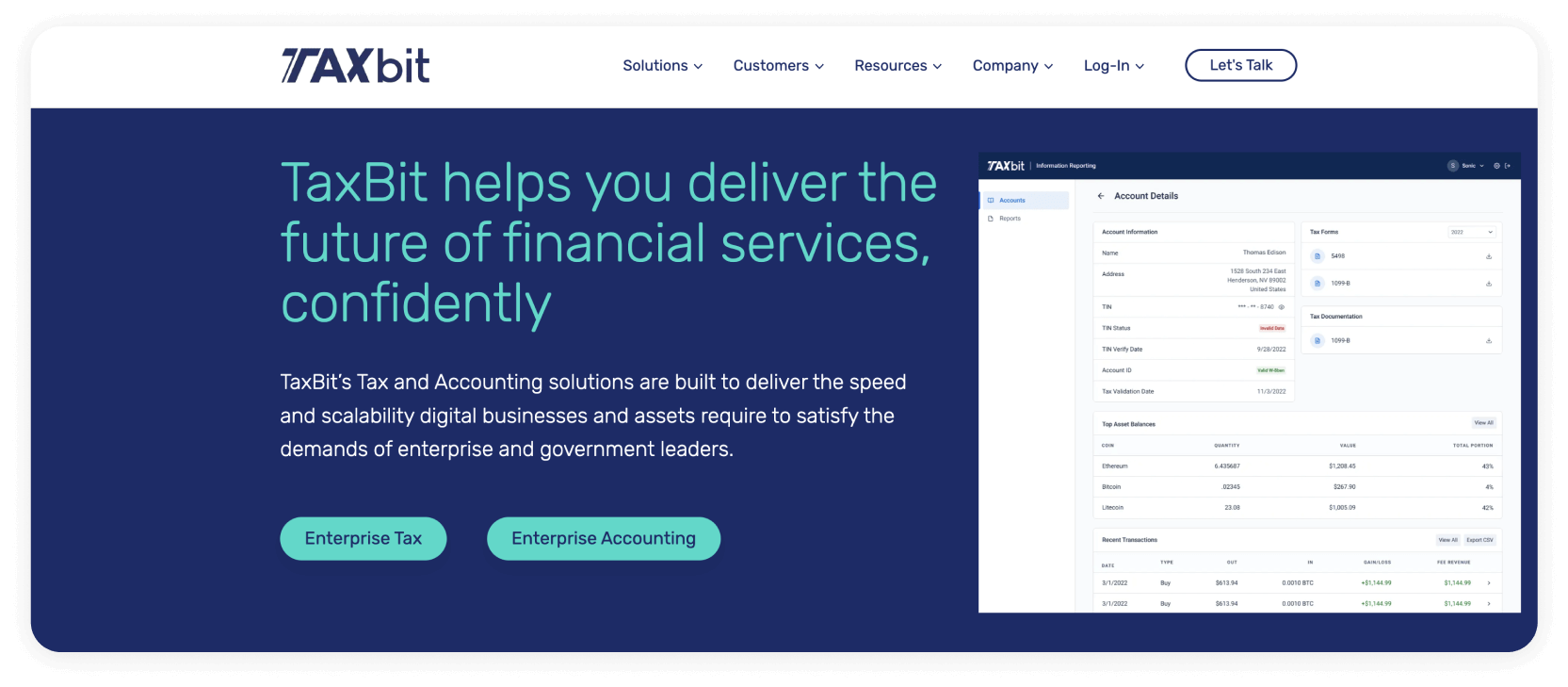
TaxBit was founded in 2018, offers basic NFT and DeFi support and has a strong focus on the United States, but can be used by anyone being subject to a similar tax regime.
They recently changed their business model to offering less features but being 100% free and supporting an unlimited number of transactions.
TaxBit offers fully supported integrations of certain exchanges, but also self-service integrations for various blockchains and wallets without any support.
Features
- 100% Free
- Poor UX
- Hard to manually edit transactions
- Basically no support
- No tax loss harvesting feature
Pricing
Free – Unlimited transactions
NFT & DeFi Support
Very basic NFT and DeFi support
NFTs are shown without images
Country Support
USA focus, available worldwide
TokenTax
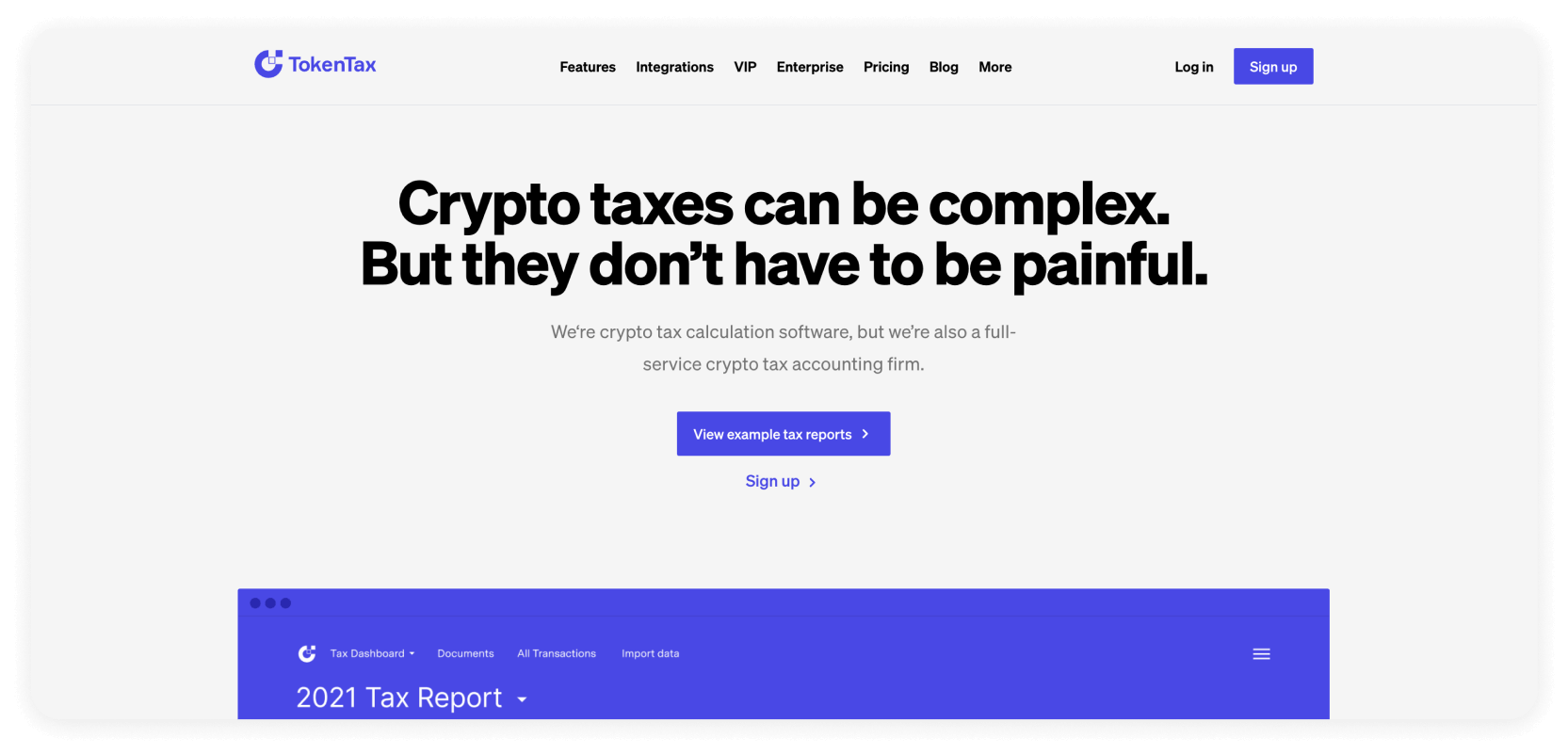
TokenTax started back in 2017 and aims to make DeFi more accessible by providing a simple and straightforward solution for crypto taxes in the US, UK and Canada.
The initial version from 2017 imported data directly from Coinbase, and the basic plan today still only supports Coinbase and Coinbase Pro accounts.
TokenTax’ crypto tax solution provides a very intuitive interface and comes with a tax-loss harvesting feature (requires premium plan or better.)
Their tax reports support FiFO, HiFO and LiFO reporting methods, thereby providing partial support for tax frameworks outside the US, UK or Canada.
Transaction data can be imported automatically from numerous exchanges via API key, inserted manually or uploaded via CSV file.
Features
- Intuitive interface
- Tax-loss harvesting feature
- No free trial
- Base plan supports only Coinbase and Coinbase Pro
Pricing
Per tax year
- Basic – $65 – up to 500 transactions
- Premium – $199 – up to 5.000 transactions, tax loss harvesting feature
- VIP – $3.499 – up to 30.000 CEX transactions, tax loss harvesting feature
Trial
No free trial
NFT & DeFi Support
Yes
Country Support
US, UK, Canada + Generic reports
Choosing the Right NFT Tax Software for Your Needs
Make sure that your chosen NFT tax software supports NFTs on the blockchain you are using.
Viewing your NFT images directly in the transaction overview of the software is a nice feature as well.
However, the most important feature to look out for is support for your local tax regulations.
Most NFT tax tools offer the option to try most features for free before purchasing a license. It is recommended to test the software intensively before making any decisions.
{{cta-banner-tax-generic="/elements/reusable-components"}}
Conclusion
Between minting, trading, selling and gifting NFTs and all the other exciting use cases, there is a good chance that your NFT activities have resulted in a tax obligation – whether you are aware of it or not.
A good NFT tax software will save you time, money and peace of mind when filing a tax report for your NFT gains and losses.
Be sure to choose a solution that fully understands your local tax regulations and stays up to date with recent developments and changes – like Blockpit!


